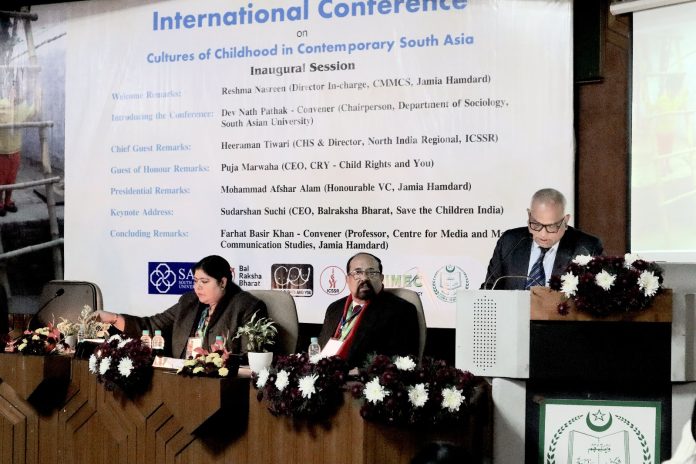New Delhi, Dec. 17: In an initiative to bridge the gap between academia and practice, the Centre for Media and Mass Communication Studies at Jamia Hamdard, in collaboration with the Department of Social Sciences at South Asian University, organized the first-ever two-day International Conference on “Cultures of Childhood in Contemporary South Asia” on December 14-15. The event proved to be a significant milestone in fostering a comprehensive understanding of the challenges faced by children in the South Asian context.
In his presidential address, Prof. (Dr.) M. Afshar Alam delved into the profound impact of socio-economic disparities on South Asian children. His emphasis on education as a pivotal tool in overcoming these challenges resonated strongly, urging attendees not to overlook the voices of children. Prof. Alam’s visionary leadership and commitment to addressing the multifaceted issues impacting children set the tone for the groundbreaking conference.
A driving force behind the event, Prof. (Dr.) Reshma Nasreen, Director (In-charge) of the Centre for Media and Mass Communication Studies, brought attention to the indispensable role of parenthood in shaping the experiences of children. Her insights provided a nuanced understanding of the intricate dynamics involved in child upbringing. Prof. Nasreen underscored the need for balance in our approach to child-rearing, recognizing the sense of responsibility instilled in South Asian children while cautioning against extreme allegiance.
Professor Farhat Basir Khan, pivotal in conceptualizing and organizing the conference, played a crucial role in championing children’s rights. His speech highlighted the responsibility of individuals and states to protect children, emphasizing the importance of prioritizing their rights beyond regional boundaries. Prof. Khan’s joint research presentation with Prof. Reshma Nasreen on “Children and Media Ecology in India with a Media Perspective” showcased their dedication to advancing knowledge on the subject.
As a plenary speaker, Prof. Khan asserted, “Children must be given priority regardless of any regions,” underlining the significance of initiating a dialogue on childhood.
Guest speakers, including CEO of CRY Puja Marwaha and Sudarshan Suchi, CEO of Balraksha Bharat, Save the Children India, further discussed challenges and opportunities in ensuring a brighter future for children.
The collaboration between Jamia Hamdard and South Asian University received support from various organizations, including Child Right & You (CRY), New Delhi, North India Regional ICSSR, New Delhi, Bal Raksha Bharat, Gurugram, and SIMEC, Dhaka, Bangladesh. The International Conference on “Cultures of Childhood in Contemporary South Asia” emerged as a pivotal platform for thought leaders and organizers.
The event witnessed a diverse gathering of over a hundred research scholars, academicians, social workers, and professionals from Sri Lanka, Bangladesh, and Nepal. Their active participation and meaningful contributions further enriched the discussions, solidifying the conference as a beacon for progress in understanding and addressing the challenges faced by children in South Asia.
The valedictory session was chaired by Dr. Dev Nath Pathak, Chairperson, Department of Sociology, South Asian University and the valedictory address was given by Dr. Rajesh Tandon, (Founding President, PRIA) highlighted the urgent need to combat discrimination against children. Dr. Ratan Kumar Roy from BRAC University, Bangladesh expressed heartfelt gratitude in the vote of thanks to panelists, speakers, delegates, volunteers, and the entire CMMS faculty and students of Jamia Hamdard.
This International Conference on “Cultures of Childhood in Contemporary South Asia” stands as a significant milestone in bridging the gap between academia and practice, fostering a holistic understanding of the challenges faced by children in the South Asian context.




